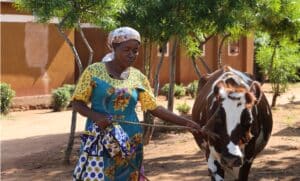From failed harvests to a thriving farming business
Kenyan farmer Theresia has learned through Dorcas training to cultivate crops that require minimal rainfall. As a result of this change, her farming business has flourished in recent years, enabling her to support her family.
‘Welcome to my farm. My name is Theresia. My husband and I have one child, three grandchildren, and three great-grandchildren. We all live on this plot of land. I have always been a farmer. In the past, I grew crops like maize and beans. Since attending training sessions with Dorcas, I opt for crops that require less rain, so that harvests are no longer as prone to failure during prolonged periods of drought. Climate change has made weather conditions much less predictable than before.
Milk and hay
During Dorcas training, I learned how to sow, care for, harvest, process, preserve, and market crops. I have specialised in pasture and dairy production. I started with one cow in 2016. Now I also grow grass, which means I can immediately provide food for my cow. The income I derive from my milk and hay is sufficient to sustain us.
Climate change
My grass looks beautiful, even though the rainy season is taking longer to arrive than usual. That’s because I’ve learned how to capture and use water to prevent my grass from withering. Additionally, together with other committed farmers in the area, we have planted trees, having learned how crucial trees are in combating and mitigating climate change. The trees on my land help keep this place cooler than other areas nearby and make the soil less prone to erosion.
Growing grass is much cheaper and simpler than growing vegetables. It practically grows by itself, requiring minimal weed control. Last year, I sold over 500 kilos of hay. With this income, I was able to buy a second cow, thus increasing my earnings from milk. This way, I hope to further expand my business.
Expansion
My next step is to buy a third cow. After that, it will be time to hire someone to help us on the farm. It’s becoming so much work that we can no longer handle production alone. I also dream of building a large shed to store the hay. But I take it step by step, investing only when I can afford it. I am grateful to have so much to dream about, knowing that these dreams can someday become reality.’

Value chains in Kenya
In Kenya, as in many other African countries, many people depend on their own agriculture. Unfortunately, due to climate change, weather conditions are much less predictable, leading to long periods of drought and failed harvests. Therefore, it is important for farmers to learn to cultivate new products.
Our local colleague explains: ‘Through this project involving value chains, we teach Kenyans like Theresia to cultivate products that are less affected by drought, such as hay, milk, honey, and mung beans. There is high demand for these products, yet there is little supply. This means that these products yield high returns. We select vulnerable people from the community to carry out the production process, enabling them to earn a good income and provide for their families.’
22 March 2024